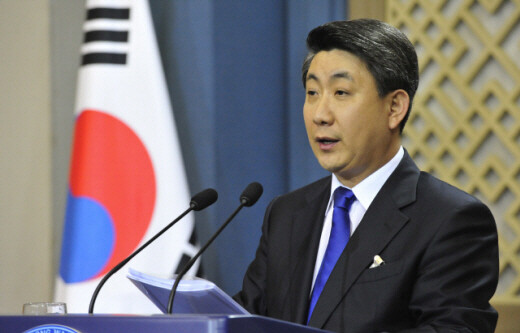hankyoreh
Links to other country sites 다른 나라 사이트 링크
Divergent briefings raise questions about Lee-Medvedev telephone conversation

Significantly different briefings issued by South Korea and Russia regarding President Lee Myung-bak’s phone conversation with Russian President Dmitry Medvedev regarding the sinking of the Cheonan emerged Tuesday.
The Cheong Wa Dae (the presidential office in South Korea or Blue House) stated in a briefing after the phone call that President Medvedev pledged to work to send North Korea the proper signal while guaranteeing peace and security on the Korean Peninsula. The Cheong Wa Dae also said President Medvedev has a firm understanding of the North Korea measures explained to him by President Lee during the conversation, including the issue of referring the matter to the UN Security Council.
In a briefing by the Presidential Executive Office of Russia, however, none of these expressions were used. Instead, it says the President Medvedev expressed hope that through the adoption of restrained attitudes that tensions on the Korean Peninsula would heighten no further. It also said the two leaders expressed regret that an inter-Korean trade and economy project planned several years ago in which Russia was also a slated participant had not materialized, and that the current situation had deteriorated into confrontation.
There was a significant difference in tone. The South Korean government seemed to imply that Russia had agreed to cooperate in measures against North Korea, while Russia stressed opposition to raising tensions on the Korean Peninsula and restraint on the part of North Korea and South Korea.
In response, the Cheong Wa Dae said Wednesday that they could not release the full content of the two leaders’ discussion, but that South Korea had made its briefing from the position as a party of the Cheonan sinking, while Russia made its briefing in consideration of its role on the international stage. The Cheong Wa Dae also explained that Russia’s released statement that it did not wish for tensions on the Korean Peninsula to rise and South Korea’s released statement about guaranteeing peace and security on the Korean Peninsula did not contradict one another.
There was a difference in the way both countries reported that the telephone conversation came about. The Cheong Wa Dae briefing claimed Russia called first, while the Russian briefing said the phone call came about due to a proposal from Korea. The Cheong Wa Dae admitted that the phone call came about after a proposal by South Korean, noting that the phone conversations with the leaders of the U.S., Japan and Australia had naturally came about after South Korea, a party to the Cheonan sinking, made a proposal.
“Even if it is customary for each nation to issue their own briefings, for the content of the briefings to be at odds regarding basic facts, such as dropping statements the other country found important and how the phone calls took place, is highly problematic,” said an official in the foreign policy sector in response to the discrepancy.
Please direct questions or comments to [englishhani@hani.co.kr]
Editorial・opinion
![[Column] Park Geun-hye déjà vu in Yoon Suk-yeol [Column] Park Geun-hye déjà vu in Yoon Suk-yeol](https://flexible.img.hani.co.kr/flexible/normal/500/300/imgdb/original/2024/0424/651713945113788.jpg) [Column] Park Geun-hye déjà vu in Yoon Suk-yeol
[Column] Park Geun-hye déjà vu in Yoon Suk-yeol![[Editorial] New weight of N. Korea’s nuclear threats makes dialogue all the more urgent [Editorial] New weight of N. Korea’s nuclear threats makes dialogue all the more urgent](https://flexible.img.hani.co.kr/flexible/normal/500/300/imgdb/original/2024/0424/7317139454662664.jpg) [Editorial] New weight of N. Korea’s nuclear threats makes dialogue all the more urgent
[Editorial] New weight of N. Korea’s nuclear threats makes dialogue all the more urgent- [Guest essay] The real reason Korea’s new right wants to dub Rhee a founding father
- [Column] ‘Choson’: Is it time we start referring to N. Korea in its own terms?
- [Editorial] Japan’s rewriting of history with Korea has gone too far
- [Column] The president’s questionable capacity for dialogue
- [Column] Are chaebol firms just pizza pies for families to divvy up as they please?
- [Column] Has Korea, too, crossed the Rubicon on China?
- [Correspondent’s column] In Japan’s alliance with US, echoes of its past alliances with UK
- [Editorial] Does Yoon think the Korean public is wrong?
Most viewed articles
- 1‘We must say no’: Seoul defense chief on Korean, USFK involvement in hypothetical Taiwan crisis
- 2[Reportage] On US campuses, student risk arrest as they call for divestment from Israel
- 3[Column] Park Geun-hye déjà vu in Yoon Suk-yeol
- 4‘Weddingflation’ breaks the bank for Korean couples-to-be
- 5Korea sees more deaths than births for 52nd consecutive month in February
- 6N. Korean delegation’s trip to Iran shows how Pyongyang is leveraging ties with Moscow
- 7Amnesty notes ‘erosion’ of freedom of expression in Korea in annual human rights report
- 8Will NewJeans end up collateral damage in internal feud at K-pop juggernaut Hybe?
- 9N. Korean hackers breached 10 defense contractors in South for months, police say
- 10[Guest essay] The real reason Korea’s new right wants to dub Rhee a founding father